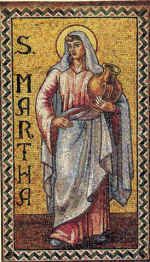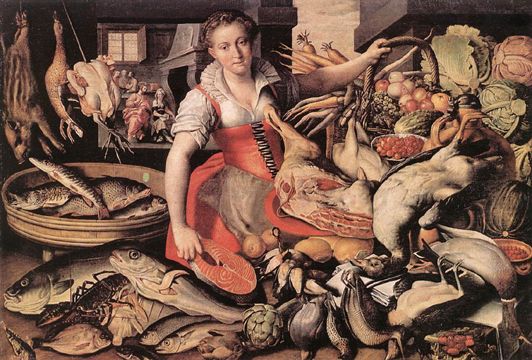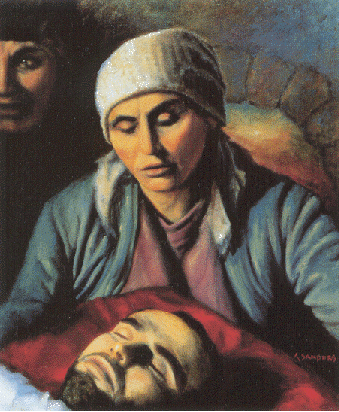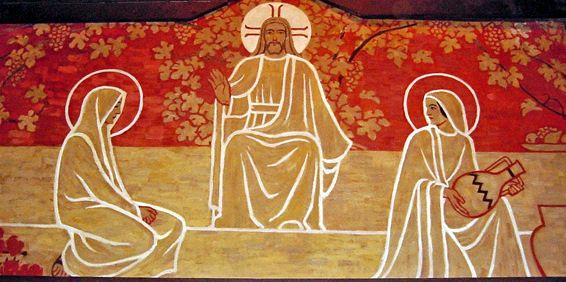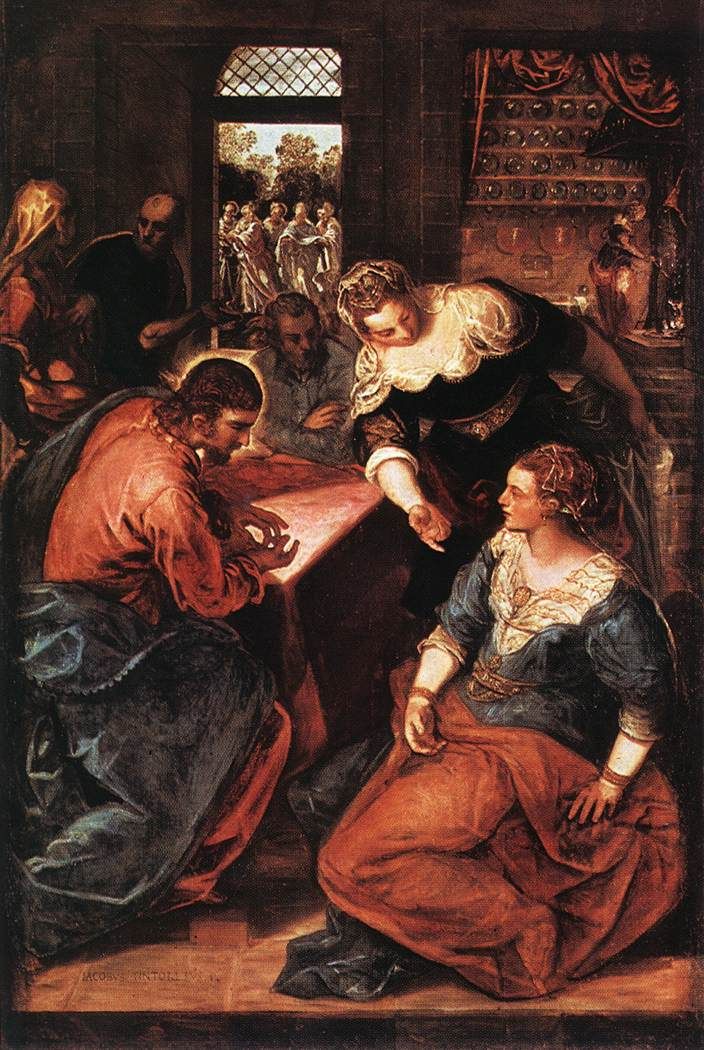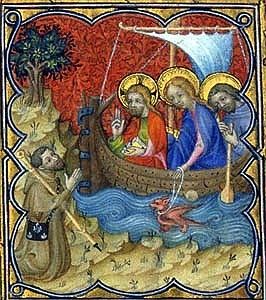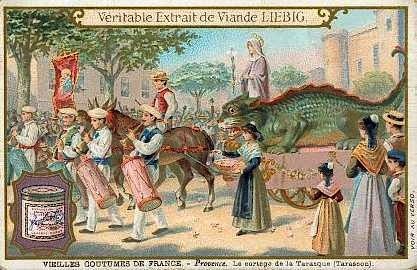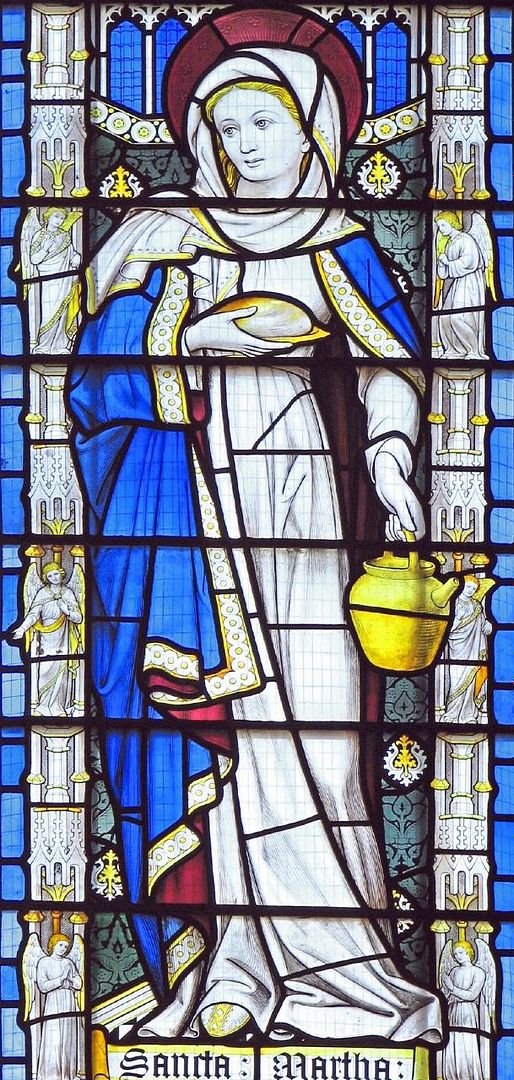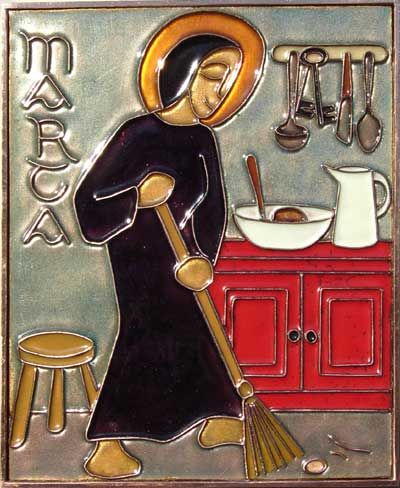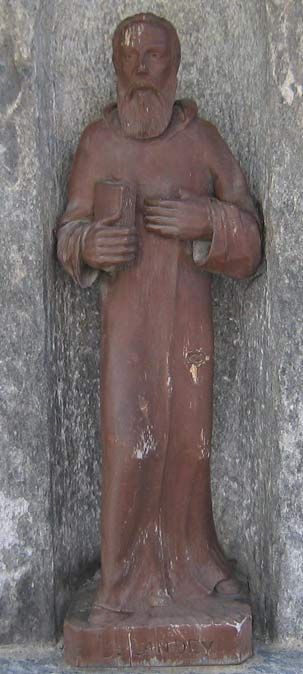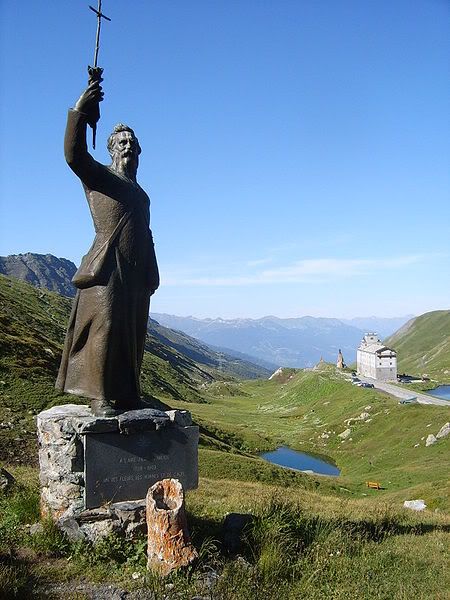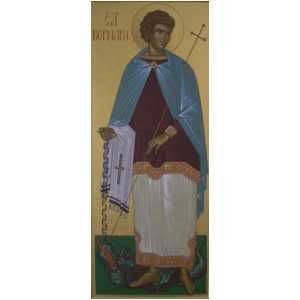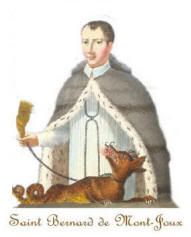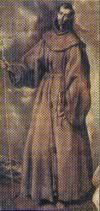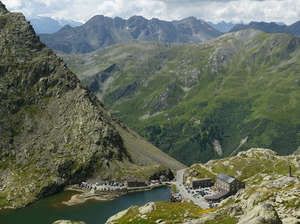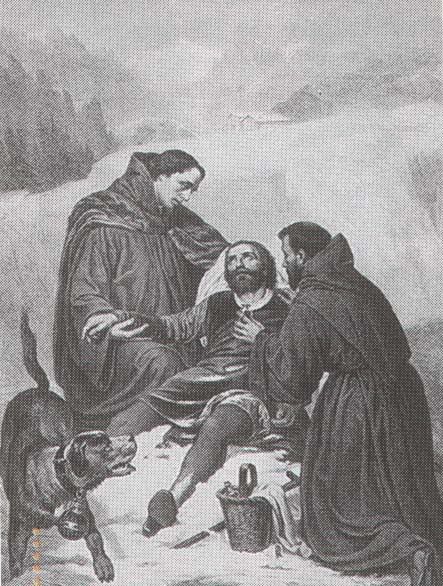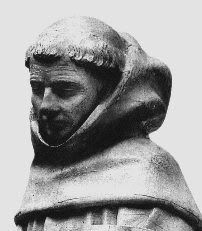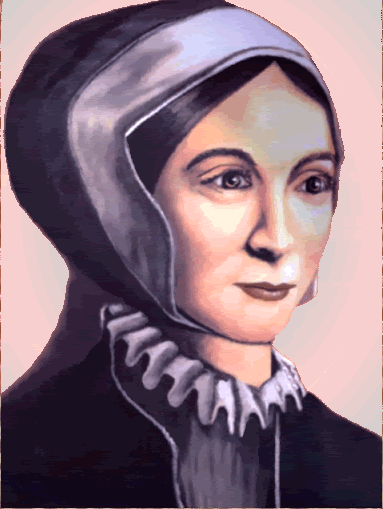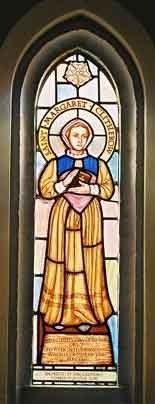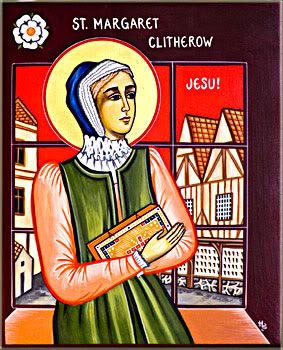Today, July 29, we celebrate the feast day of Saint Martha, sister of Mary and Lazarus (whom the Lord raised from the dead), and friend and follower of Jesus. Saint Martha is frequently referred to as “the Lord’s Worker and Servant,” given her role in Scriptures as cooking and serving the Lord upon his visits to the home of Mary, Martha, and Lazarus. Following the initial rebuke of her resentment by Jesus, Martha became recognized for her embodiment of Christian hospitality. She remains the patron saint of cooks and servants.
We first encounter Martha in the Scriptures, during a visit that Jesus and the disciples make to her home. Apparently Jesus was a frequent guest at Martha's home in Bethany, a small village two miles from Jerusalem We are told in the Gospel of John that "Jesus loved Martha and Mary and Lazarus," suggesting the quality of the special relationship Jesus shared with these three siblings.
38As Jesus and his disciples were on their way, he came to a village where a woman named Martha opened her home to him. 39She had a sister called Mary, who sat at the Lord's feet listening to what he said. 40But Martha was distracted by all the preparations that had to be made. She came to him and asked, "Lord, don't you care that my sister has left me to do the work by myself? Tell her to help me!"
41"Martha, Martha," the Lord answered, "you are worried and upset about many things, 42but only one thing is needed. Mary has chosen what is better, and it will not be taken away from her." (Luke 10: 38-42)
Martha, initially resentful of her sister, must have dwelt upon the words of Our Lord during her household tasks, and over time, realized that Jesus was speaking of the promise of eternal salvation. When next we encounter Martha, it is following her brother’s death. Having sent word to Jesus (who risked certain death upon returning to Judea), Martha is overjoyed when he arrives, and runs to greet him while her sister stays behind. It is here that we see the true conversion of Martha’s heart, as she proclaims her faith in Jesus: "Yes, Lord," she told him, "I believe that you are the Christ, the Son of God, who was to come into the world." (John 11: 27) She then says to her sister, and in turn, to each of us: "The Teacher is here and is asking for you."
1Now a man named Lazarus was sick. He was from Bethany, the village of Mary and her sister Martha. 2This Mary, whose brother Lazarus now lay sick, was the same one who poured perfume on the Lord and wiped his feet with her hair. 3So the sisters sent word to Jesus, "Lord, the one you love is sick."
4When he heard this, Jesus said, "This sickness will not end in death. No, it is for God's glory so that God's Son may be glorified through it." 5Jesus loved Martha and her sister and Lazarus. 6Yet when he heard that Lazarus was sick, he stayed where he was two more days.
7Then he said to his disciples, "Let us go back to Judea."
17On his arrival, Jesus found that Lazarus had already been in the tomb for four days. 18Bethany was less than two miles from Jerusalem, 19and many Jews had come to Martha and Mary to comfort them in the loss of their brother. 20When Martha heard that Jesus was coming, she went out to meet him, but Mary stayed at home.
21"Lord," Martha said to Jesus, "if you had been here, my brother would not have died. 22But I know that even now God will give you whatever you ask."
23Jesus said to her, "Your brother will rise again."
24Martha answered, "I know he will rise again in the resurrection at the last day."
25Jesus said to her, "I am the resurrection and the life. He who believes in me will live, even though he dies; 26and whoever lives and believes in me will never die. Do you believe this?"
27"Yes, Lord," she told him, "I believe that you are the Christ, the Son of God, who was to come into the world."
28And after she had said this, she went back and called her sister Mary aside. "The Teacher is here," she said, "and is asking for you." 29When Mary heard this, she got up quickly and went to him. 30Now Jesus had not yet entered the village, but was still at the place where Martha had met him. 31When the Jews who had been with Mary in the house, comforting her, noticed how quickly she got up and went out, they followed her, supposing she was going to the tomb to mourn there.
32When Mary reached the place where Jesus was and saw him, she fell at his feet and said, "Lord, if you had been here, my brother would not have died."
33When Jesus saw her weeping, and the Jews who had come along with her also weeping, he was deeply moved in spirit and troubled. 34"Where have you laid him?" he asked.
"Come and see, Lord," they replied.
35Jesus wept.
36Then the Jews said, "See how he loved him!"
37But some of them said, "Could not he who opened the eyes of the blind man have kept this man from dying?"
38Jesus, once more deeply moved, came to the tomb. It was a cave with a stone laid across the entrance. 39"Take away the stone," he said.
"But, Lord," said Martha, the sister of the dead man, "by this time there is a bad odor, for he has been there four days."
40Then Jesus said, "Did I not tell you that if you believed, you would see the glory of God?"
41So they took away the stone. Then Jesus looked up and said, "Father, I thank you that you have heard me. 42I knew that you always hear me, but I said this for the benefit of the people standing here, that they may believe that you sent me."
43When he had said this, Jesus called in a loud voice, "Lazarus, come out!" 44The dead man came out, his hands and feet wrapped with strips of linen, and a cloth around his face.
Jesus said to them, "Take off the grave clothes and let him go."
45Therefore many of the Jews who had come to visit Mary, and had seen what Jesus did, put their faith in him. (John 11: 1-7, 17-45)
We last find Martha, in Scripture, back where she began—toiling in the kitchen, serving the Lord, His disciples, and her brother and sister. This time, she does so without complaint, preparing a Last Supper of sorts for the family, as Jesus was moving steadily toward his arrest and crucifixion. We hear how Mary causes a commotion at dinner by anointing Jesus with expensive perfume. But all we hear about Martha is the simple statement: "Martha served." She isn't in the spotlight, she doesn't do showy things, she doesn't receive spectacular miracles. She simply serves Jesus.
1Six days before the Passover, Jesus arrived at Bethany, where Lazarus lived, whom Jesus had raised from the dead. 2Here a dinner was given in Jesus' honor. Martha served, while Lazarus was among those reclining at the table with him. 3Then Mary took about a pint of pure nard, an expensive perfume; she poured it on Jesus' feet and wiped his feet with her hair. And the house was filled with the fragrance of the perfume.
4But one of his disciples, Judas Iscariot, who was later to betray him, objected, 5"Why wasn't this perfume sold and the money given to the poor? It was worth a year's wages." 6He did not say this because he cared about the poor but because he was a thief; as keeper of the money bag, he used to help himself to what was put into it.
7"Leave her alone," Jesus replied. " It was intended that she should save this perfume for the day of my burial. 8You will always have the poor among you, but you will not always have me."
9Meanwhile a large crowd of Jews found out that Jesus was there and came, not only because of him but also to see Lazarus, whom he had raised from the dead. 10So the chief priests made plans to kill Lazarus as well, 11for on account of him many of the Jews were going over to Jesus and putting their faith in him. (John 12: 1-11)
Where Scripture leaves off, tradition steps in. We are told that Saints Martha, Mary, and Lazarus went to southern France in A.D. 48, accompanied by Saint Mary Magdalene and Saint Maximin. Here, Saint Mary Magdalene retired to a life of penance, and Saint Lazarus acted as Bishop of Marseilles. St. Martha's life in Europe was a very interesting one according to the Golden Legend:
“After the Ascension of our Lord, when the disciples were departed, she with her brother Lazarus and her sister Mary, also Saint Maximin which baptized them, and to whom they were committed of the Holy Ghost, and many others, were put into a ship without sail, oars, or rudder, which by the conduct of our Lord they came all to Marseilles, and after came to the territory of Aquense or Aix, and there converted the people to the faith. Martha was right fecund of speech, and courteous and gracious to the sight of the people.
There was that time upon the river of Rhone, in a certain wood between Arles and Avignon, a great dragon, half beast and half fish, greater than an ox, longer than an horse, having teeth sharp as a sword, and horned on either side, head like a lion, tail like a serpent, and defended him with two wings on either side, and could not be beaten with cast of stones nor with other armor, and was as strong as twelve lions or bears; which dragon lay hiding and lurking in the river, and perished them that passed by and drowned ships. He came thither by sea from Galicia, and was engendered of Leviathan, which is a serpent of the water and is much wood, and of a beast called Bonacho, that is engendered in Galicia. And when he is pursued he casts out of his belly behind, his ordure, the space of an acre of land on them that follow him, and it is bright as glass, and what it toucheth it burneth as fire.
To whom Martha, at the prayer of the people, came into the wood, and found him eating a man. And she cast on him holy water, and showed to him the cross, which anon was overcome, and standing still as a sheep, she bound him with her own girdle, and then was slain with spears and glaives of the people.
The dragon was called of them that dwelled in the country Tarasconus, whereof, in remembrance of him that place is called Tarasconus, which tofore was called Nerluc, and the Black Lake, because there be woods shadowous and black. And there the blessed Martha, by license of Maximin her master, and of her sister, dwelled and abode in the same place after, and daily occupied in prayers and in fastings, and thereafter assembled and were gathered together a great convent of sisters, and builded a fair church at the honor of the blessed Mary virgin, where she led a hard and a sharp life. She eschewed flesh and all fat meat, eggs, cheese and wine; she ate but once a day. An hundred times a day and an hundred times a night she kneeled down and bowed her knees.”
Saint Martha assembled a holy company of women, with whom she lived in great austerity of life and admirable sanctity at Tarascon where her tomb is venerated. Saint Mary’s tomb is at La Sainte-Baume; Saint Lazarus is venerated as the founder of the Church of Marseilles.
The life of Saint Martha, recorded in the Gospels of John and Luke, remind us of the importance of hospitality and service. But more importantly, they direct us back to the importance of placing Jesus at the center of our lives. Jesus clearly (and kindly, suggesting his love for Martha) says to Martha: "you are worried and upset about many things, but only one thing is needed.” In that moment, we can all identify with this humble saint—how frequently do the small worries of our lives distract us from the love of the Lord, His plan for our salvation, and the grace which comes to us from Him, through the intercession of Our Blessed Mother? He tells Martha that her sister has, by dropping the cares and worries of the world and sitting at His feet “has chosen what is better, and it will not be taken away from her." Martha, upon hearing these words, opens herself to the Lord, professes her faith, and continues to serve him humbly and wholeheartedly, without complaint—a lesson which we might all benefit from!
Father,
your Son honored St. Martha
by coming to her home as a guest.
By her prayers
may we serve Christ in our brothers and sisters
and be welcomed by you into heaven, our true home.
We ask this through our Lord Jesus Christ, your Son,
who lives and reigns with you and the Holy Spirit,
one God, for ever and ever. Amen.
Prayer for Hospitality
O Sweet Jesus, Saint Martha lived in Bethany with her brother and sister, Saints Lazarus and Mary. She attended to Your physical needs while You rested and fellowshipped with good friends. I ask her to pray for my gift of hospitality. Teach me, dear Lord, how to truly welcome friends, family, and strangers. Increase in me the same respect for them as I would give to You if You appeared in the flesh. Help me to invite You into my home through the choices I make in television shows, conversations with others, and the type of jokes I tell or listen to. Give me a spirit of holy hospitality. Saint Martha, pray for me. Amen.
Why pray the Rosary every day for a year?
Each time the Blessed Virgin has appeared-- whether it be to Saint Bernadette Soubirous at Lourdes; to Lucia, Jacinta, and Francisco at Fatima; or to Mariette Beco at Banneux-- she has asserted the importance, saving grace, and power of praying the Holy Rosary on a daily basis. Based upon her words, the Rosary is penance and conversion for sinners, a pathway to peace, an end to war, and a powerful act of faith in Jesus Christ. Pope Paul VI presented the Rosary as a powerful means to reach Christ "not merely with Mary but indeed, insofar as this is possible to us, in the same way as Mary, who is certainly the one who thought about Him more than anyone else has ever done."
To show us how this is done, perhaps no one has been more eloquent than the great Cardinal Newman, who wrote: "The great power of the Rosary consists in the fact that it translates the Creed into Prayer. Of course, the Creed is already in a certain sense a prayer and a great act of homage towards God, but the Rosary brings us to meditate again on the great truth of His life and death, and brings this truth close to our hearts. Even Christians, although they know God, usually fear rather than love Him. The strength of the Rosary lies in the particular manner in which it considers these mysteries, since all our thinking about Christ is intertwined with the thought of His Mother, in the relations between Mother and Son; the Holy Family is presented to us, the home in which God lived His infinite love."
As Mary said at Fatima, "Jesus wants to use you to make Me known and loved. He wishes to establish the devotion to My Immaculate Heart throughout the world. I promise salvation to whoever embraces it; these souls will be dear to God, like flowers put by Me to adorn his throne."

Today, June 10, we celebrate the feast day of Saint Landry (Landericus) of Paris (died 661), twenty-seventh bishop of Paris, France. Little is known of the life of this holy man prior to his bishopric which began in 650 and continued until his death. During that time, he demonstrated considerable care for the poor, sick, and needy of the city, worked many miracles, and greatly improved the healthcare available to those in need.
When Saint Landry was appointed bishop, he was confronted with a city in desperate need. Poverty and sickness was rampant, and many of the working poor were unable to meet their most basic needs. Every day, more and more poor and sick—unable to survive in the countryside—streamed into the city looking for shelter, healthcare, food, and work… and the few social services available were already stretched to their limits! Saint Landry worked tirelessly to serve the children of God—specifically those that no one else would serve. He sold all of his personal possessions, and then systematically began selling off the Church’s possessions to better serve the poor. He is reported to have melted down the extra sacred vessels stored in the Church, using the money to assist in times of famine and plague.
Saint Landry built the first hospital for the poor in Paris, dedicated to Saint Christopher, placing it directly beside the Cathedral of Notre Dame. This Cathedral hospital (which eventually became the famous hospital Hôtel-Dieu de Paris) would minister to anyone, through the love of Christ, the emerging science of medicine, and Christian charity. Not only did Saint Landry provide healthcare, but food, clothing, and basic needs to the poor of Europe. In time, the hospital and poorhouse became a model for bishops throughout Europe, making the love of Christ shine in the midst of the darkest period of the Dark Ages.
Saint Landry is also remembered for expanding available religious instruction and guidance to the citizens of Paris through his welcoming of a community of Benedictine monks, leading to the institution of the Abbey of Denis.
Upon his death, in 651, Saint Landry was buried in the church of Saint-Germain-des-Pres, then called Saint Vincent's, where his relics, except two bones given to the parish of Saint Landry in 1408, are kept in a silver shrine. His relics, hidden during the French Revolution, have been returned to their original burial place. Numerous miracles—both during his life and following his death at his tomb—have been reported.
The life and miracles of Saint Landry, as recorded in the Golden Legend:
“Saint Landry, of whom hereafter we joyfully shall make memory and solemnity, was right glorious bishop of Paris… He sat in the chair of the church cathedral of Paris in that time that the noble Clovis reigned king in France, which by the great and fervent love that he had to the church of Saint Denis gave to the same many gifts, and made the said church much rich, as the privileges of the religious there testify to this day, twenty-six bishops were in the chair of the church of Paris before Saint Landry as above is said, of whom the names be written in the privileges of the said church, and nevertheless none of them all was made archbishop. All the intention of Saint Landry whiles that he lived in this world was to accomplish misericord, and he himself departed or dealt the alms to the poor at all times.
We have seen and known that a man which men call Raoul Gracard was smitten suddenly, and had the head much great and swollen, and was so red in the face of him that all folk that saw him deemed and held him for a leper Which man with great haste came to the presence of Saint Landry, and there he confessed him much devoutly, receiving much benignly his penance, and after he came to the sudary of the saint and with great devotion kissed it, and when he had done his offering and vow with much great faith and hope he returned, and unnethe he was come to his house when he became as whole as ever he was. Be therefore the name of God praised, who for his good friend Saint Landry he healed so promptly the foresaid patient.
Upon another time a squire fell of palsy so much that he could not help himself with foot nor with hands. His friends seeing him so oppressed of this sickness made a bargain with a physician for to help him. It happed so that on a day as this poor man saw himself so oppressed with the said sickness and no remedy might be found to it, he began for to weep and to reclaim Saint Landry saying: "O blessed Saint Landry, vouchsafe to behold on my misery," and then he prayed that they would bear him unto the sepulchre of Saint Landry, which did as he prayed them. Then the bishop of Paris named Maurice, that was there, seeing the devotion of the said sick man, prayed to Saint Landry that health he would impetre unto God for him by his glorious merits, and with one of the teeth of the saint touched the places on his body that most grieved him, making the sign of the cross, and anon he became all whole.
Item, it is read of a knight named Gilbert that had a thorn within his knee, whereto he found no remedy by no manner of medicine and was as desperate, not only for the dolor and pain that he suffered, but also for fault of hope to be healed, the which knight made him to be borne into the church of Saint Landry, and with his sudary did to be made over him the sign of the cross, and anon after, the thorn issued out from his knee, and was all whole, healed by the merits of the saint, whom we beseech to pray God for us. Amen.”
Saint Landry was a practical man, filled with a love of the Lord that led him to service and charity. Not content to contemplate the plight of the poor and sick, as many leaders of the day were doing, Landry sacrificed and tirelessly worked to improve their lives. He sold his possessions and instituted a great center and model of healing and charity—ministering to both the practical and spiritual needs of his congregation. All too often we think or wonder or worry, rather than taking action. We wait for signs or certainty, rather than trying to make the change we would like to see. Saint Landry reminds us that action—inspired by the Lord and supported through prayer—can change the lives of those around us. In the process, it just might change our lives as well, bringing us closer to the Lord through charity and service!
Prayer for Charity:
O my Jesus, Thou who art very Love,
enkindle in my heart that Divine Fire
which consumes the Saints and transforms them into Thee.
O Lord our God,
we offer Thee our hearts
united in the strongest and most sincere love of brotherhood;
we pray that Jesus in the Blessed Sacrament
may be the daily food of our souls and bodies;
that Jesus may be established as the center of our affections,
even as He was for Mary and Joseph.
Finally, O Lord, may sin never disturb our union on earth;
and may we be eternally united in heaven with Thee
and Mary and Joseph and with all Thy Saints.
Amen.
When Saint Landry was appointed bishop, he was confronted with a city in desperate need. Poverty and sickness was rampant, and many of the working poor were unable to meet their most basic needs. Every day, more and more poor and sick—unable to survive in the countryside—streamed into the city looking for shelter, healthcare, food, and work… and the few social services available were already stretched to their limits! Saint Landry worked tirelessly to serve the children of God—specifically those that no one else would serve. He sold all of his personal possessions, and then systematically began selling off the Church’s possessions to better serve the poor. He is reported to have melted down the extra sacred vessels stored in the Church, using the money to assist in times of famine and plague.
Saint Landry built the first hospital for the poor in Paris, dedicated to Saint Christopher, placing it directly beside the Cathedral of Notre Dame. This Cathedral hospital (which eventually became the famous hospital Hôtel-Dieu de Paris) would minister to anyone, through the love of Christ, the emerging science of medicine, and Christian charity. Not only did Saint Landry provide healthcare, but food, clothing, and basic needs to the poor of Europe. In time, the hospital and poorhouse became a model for bishops throughout Europe, making the love of Christ shine in the midst of the darkest period of the Dark Ages.
Saint Landry is also remembered for expanding available religious instruction and guidance to the citizens of Paris through his welcoming of a community of Benedictine monks, leading to the institution of the Abbey of Denis.
Upon his death, in 651, Saint Landry was buried in the church of Saint-Germain-des-Pres, then called Saint Vincent's, where his relics, except two bones given to the parish of Saint Landry in 1408, are kept in a silver shrine. His relics, hidden during the French Revolution, have been returned to their original burial place. Numerous miracles—both during his life and following his death at his tomb—have been reported.
The life and miracles of Saint Landry, as recorded in the Golden Legend:
“Saint Landry, of whom hereafter we joyfully shall make memory and solemnity, was right glorious bishop of Paris… He sat in the chair of the church cathedral of Paris in that time that the noble Clovis reigned king in France, which by the great and fervent love that he had to the church of Saint Denis gave to the same many gifts, and made the said church much rich, as the privileges of the religious there testify to this day, twenty-six bishops were in the chair of the church of Paris before Saint Landry as above is said, of whom the names be written in the privileges of the said church, and nevertheless none of them all was made archbishop. All the intention of Saint Landry whiles that he lived in this world was to accomplish misericord, and he himself departed or dealt the alms to the poor at all times.
We have seen and known that a man which men call Raoul Gracard was smitten suddenly, and had the head much great and swollen, and was so red in the face of him that all folk that saw him deemed and held him for a leper Which man with great haste came to the presence of Saint Landry, and there he confessed him much devoutly, receiving much benignly his penance, and after he came to the sudary of the saint and with great devotion kissed it, and when he had done his offering and vow with much great faith and hope he returned, and unnethe he was come to his house when he became as whole as ever he was. Be therefore the name of God praised, who for his good friend Saint Landry he healed so promptly the foresaid patient.
Upon another time a squire fell of palsy so much that he could not help himself with foot nor with hands. His friends seeing him so oppressed of this sickness made a bargain with a physician for to help him. It happed so that on a day as this poor man saw himself so oppressed with the said sickness and no remedy might be found to it, he began for to weep and to reclaim Saint Landry saying: "O blessed Saint Landry, vouchsafe to behold on my misery," and then he prayed that they would bear him unto the sepulchre of Saint Landry, which did as he prayed them. Then the bishop of Paris named Maurice, that was there, seeing the devotion of the said sick man, prayed to Saint Landry that health he would impetre unto God for him by his glorious merits, and with one of the teeth of the saint touched the places on his body that most grieved him, making the sign of the cross, and anon he became all whole.
Item, it is read of a knight named Gilbert that had a thorn within his knee, whereto he found no remedy by no manner of medicine and was as desperate, not only for the dolor and pain that he suffered, but also for fault of hope to be healed, the which knight made him to be borne into the church of Saint Landry, and with his sudary did to be made over him the sign of the cross, and anon after, the thorn issued out from his knee, and was all whole, healed by the merits of the saint, whom we beseech to pray God for us. Amen.”
Saint Landry was a practical man, filled with a love of the Lord that led him to service and charity. Not content to contemplate the plight of the poor and sick, as many leaders of the day were doing, Landry sacrificed and tirelessly worked to improve their lives. He sold his possessions and instituted a great center and model of healing and charity—ministering to both the practical and spiritual needs of his congregation. All too often we think or wonder or worry, rather than taking action. We wait for signs or certainty, rather than trying to make the change we would like to see. Saint Landry reminds us that action—inspired by the Lord and supported through prayer—can change the lives of those around us. In the process, it just might change our lives as well, bringing us closer to the Lord through charity and service!
Prayer for Charity:
O my Jesus, Thou who art very Love,
enkindle in my heart that Divine Fire
which consumes the Saints and transforms them into Thee.
O Lord our God,
we offer Thee our hearts
united in the strongest and most sincere love of brotherhood;
we pray that Jesus in the Blessed Sacrament
may be the daily food of our souls and bodies;
that Jesus may be established as the center of our affections,
even as He was for Mary and Joseph.
Finally, O Lord, may sin never disturb our union on earth;
and may we be eternally united in heaven with Thee
and Mary and Joseph and with all Thy Saints.
Amen.
Today, May 28, we celebrate the feast day of Saint Bernard of Montjoux (923-1008), the patron saint of skiers, alpinists, hikers, and travelers in the mountains, and minister to Alpine travelers for over 40 years. He is remembered for his devotion to the Lord, and tireless preaching of His word to travelers, living and working in the most inhospitable of places, and through warmth and comfort offered to travelers, converting many.
The early life of Saint Bernard is lost to Holy Legend. Sources suggest that Bernard was born of nobility, likely in Italy or France, and left home to study in Paris. Upon the arrangement of an honorable marriage by his parents, Bernard returned home to profess his preference to devote himself to the Lord, entering the religious life. Some scholars suggest that his parents, pagans perhaps, were not pleased with this and locked him in the tower of their chateau. Saint Bernard is said to have thrown himself from the tower, only to be carried by angels the forty feet to the ground and set gently upon it. He is said to have fled to the monastery.
Church scholars agree that Saint Bernard found his way to the Benedictine Order, entering the monastery at Aosta, Italy, and eventually becoming ordained a priest. Recognized for his patience and obedience, as well as his knowledge and virtue, Saint Bernard was made archbishop of the Alpine Diocese, a most inhospitable route through the mountains between Italy and Switzerland. This was a common path of pilgrimage for those journeying to Rome, and was also quite dangerous due to weather and thieves.
Saint Bernard undertook his charge with vigor, establishing two hospices in the pass that would eventually be named for him—one at the highest point (8,000 feet) and one at the second highest point (7,076 feet)—both perpetually covered with approximately 8 feet of snow. He further built and dedicated a church to Saint Nicholas there. He filled the buildings with warmth and love, catering to travelers and strangers, always finding time to speak with them about the love of God. Bernard organized roving patrols throughout the mountain pass, driving out the thieves and brigands. Having obtained permission from Rome, he invited members of the Augustine Order to help him minister to travelers. With their help, he patrolled the mountains searching for lost travelers, oftentimes with dogs carrying water around their necks—the same dogs that would eventually be named for him. The Order offered food, clothing, and shelter to the travelers and took care of the unfortunate who perished during the journey. They depended solely on gifts and collections for sustenance.
Saint Bernard’s life was one of simple service in a difficult environment. His hospitality was legendary, and his works survive today in the form of the hospices he established. His community—the Houses and Congregations of Saints Nicholas and Bernard—remains active today, maintaining the Alpine hospices as well as one in the Himalayas. Upon his death, he was interred at the cloisters of Saint Lawrence. Numerous miracles were reported at the site of his burial, as well as in Saint Bernard’s pass. We are inspired by the love of Saint Bernard to extend ourselves to those in need, never missing an opportunity to show God’s love. Saint Bernard reminds us of the epistle of Saint Peter (1 Peter 4: 7-11):
7The end of all things is near. Therefore be clear minded and self-controlled so that you can pray. 8Above all, love each other deeply, because love covers over a multitude of sins. 9Offer hospitality to one another without grumbling. 10Each one should use whatever gift he has received to serve others, faithfully administering God's grace in its various forms. 11If anyone speaks, he should do it as one speaking the very words of God. If anyone serves, he should do it with the strength God provides, so that in all things God may be praised through Jesus Christ. To him be the glory and the power for ever and ever. Amen.
Year 2: Day 148 of 365
Prayer Intentions: Hearts of Hospitality
Requested Intentions: Husband’s freedom from illness (L); Personal intentions (S); Successful passing of dental board examination (P); Blessings on a family (Z); Successful permanent employment (C); Healing of a son with autism (J); Son’s successful employment (L); For the intentions of family and relatives, for the Carthusian community (T); For personal intentions (A); Restoration of lost hearing (C); Resolution of relational and financial challenges (S); Comfort following loss of husband, security for family, assistance with housing (B); Healing and return of brother (O); Successful hermitage foundation (S); Support from family, permission to marry (H); Recovery of wife following surgery, freedom from depression (W); Protection and recovery of mentally ill daughter (J); Successful resolution to legal proceedings (N); Freedom from worry and successful employment (M); For successful sale of home and freedom from debt (J); Freedom from pain and illness (E).
The early life of Saint Bernard is lost to Holy Legend. Sources suggest that Bernard was born of nobility, likely in Italy or France, and left home to study in Paris. Upon the arrangement of an honorable marriage by his parents, Bernard returned home to profess his preference to devote himself to the Lord, entering the religious life. Some scholars suggest that his parents, pagans perhaps, were not pleased with this and locked him in the tower of their chateau. Saint Bernard is said to have thrown himself from the tower, only to be carried by angels the forty feet to the ground and set gently upon it. He is said to have fled to the monastery.
Church scholars agree that Saint Bernard found his way to the Benedictine Order, entering the monastery at Aosta, Italy, and eventually becoming ordained a priest. Recognized for his patience and obedience, as well as his knowledge and virtue, Saint Bernard was made archbishop of the Alpine Diocese, a most inhospitable route through the mountains between Italy and Switzerland. This was a common path of pilgrimage for those journeying to Rome, and was also quite dangerous due to weather and thieves.
Saint Bernard undertook his charge with vigor, establishing two hospices in the pass that would eventually be named for him—one at the highest point (8,000 feet) and one at the second highest point (7,076 feet)—both perpetually covered with approximately 8 feet of snow. He further built and dedicated a church to Saint Nicholas there. He filled the buildings with warmth and love, catering to travelers and strangers, always finding time to speak with them about the love of God. Bernard organized roving patrols throughout the mountain pass, driving out the thieves and brigands. Having obtained permission from Rome, he invited members of the Augustine Order to help him minister to travelers. With their help, he patrolled the mountains searching for lost travelers, oftentimes with dogs carrying water around their necks—the same dogs that would eventually be named for him. The Order offered food, clothing, and shelter to the travelers and took care of the unfortunate who perished during the journey. They depended solely on gifts and collections for sustenance.
Saint Bernard’s life was one of simple service in a difficult environment. His hospitality was legendary, and his works survive today in the form of the hospices he established. His community—the Houses and Congregations of Saints Nicholas and Bernard—remains active today, maintaining the Alpine hospices as well as one in the Himalayas. Upon his death, he was interred at the cloisters of Saint Lawrence. Numerous miracles were reported at the site of his burial, as well as in Saint Bernard’s pass. We are inspired by the love of Saint Bernard to extend ourselves to those in need, never missing an opportunity to show God’s love. Saint Bernard reminds us of the epistle of Saint Peter (1 Peter 4: 7-11):
7The end of all things is near. Therefore be clear minded and self-controlled so that you can pray. 8Above all, love each other deeply, because love covers over a multitude of sins. 9Offer hospitality to one another without grumbling. 10Each one should use whatever gift he has received to serve others, faithfully administering God's grace in its various forms. 11If anyone speaks, he should do it as one speaking the very words of God. If anyone serves, he should do it with the strength God provides, so that in all things God may be praised through Jesus Christ. To him be the glory and the power for ever and ever. Amen.
Prayer Intentions: Hearts of Hospitality
Requested Intentions: Husband’s freedom from illness (L); Personal intentions (S); Successful passing of dental board examination (P); Blessings on a family (Z); Successful permanent employment (C); Healing of a son with autism (J); Son’s successful employment (L); For the intentions of family and relatives, for the Carthusian community (T); For personal intentions (A); Restoration of lost hearing (C); Resolution of relational and financial challenges (S); Comfort following loss of husband, security for family, assistance with housing (B); Healing and return of brother (O); Successful hermitage foundation (S); Support from family, permission to marry (H); Recovery of wife following surgery, freedom from depression (W); Protection and recovery of mentally ill daughter (J); Successful resolution to legal proceedings (N); Freedom from worry and successful employment (M); For successful sale of home and freedom from debt (J); Freedom from pain and illness (E).
On March 26, we celebrate the feast day of Saint Margaret Clitherow (1555-1586), English saint and martyr. Saint Margaret lived and died during the reign of Queen Elizabeth I, and a time of great persecution of Catholics in England. At that time, priests were not allowed to reside within the country, and those sympathetic to the Catholic faith, celebrating Mass, or providing shelter to priests were found guilty of treason. For many, however, the faith continued undaunted, the celebration of Mass held more important than the danger of discovery.
Margaret was born in Middleton, England, to faithful Protestant parents. Intelligent, funny, and attractive, Margaret grew up in the Protestant faith, and was married at 18 to a butcher, John Clitherow. Together, they had three children, and were content to live a respectable middle-class life. Margaret demonstrated a keen mind for business, and frequently assisted her husband in the butcher shop. She was known for her kind heart and warm smile.
Margaret found herself dissatisfied with the Protestant faith, and eventually converted to Catholicism, instructing her children in the way of the Church. Her confessor, after her death, wrote of her conversion that Margaret "found no substance, truth nor Christian comfort in the ministers of the new church, nor in their doctrine itself, and hearing also many priests and lay people to suffer for the defense of the ancient Catholic Faith." Margaret’s husband did not convert, but was respectful of her faith, and allowed the children to be raised Catholic. Their eldest son left England, and moved to France to enter the seminary.
Despite the risk of discovery, Margaret had a “priest hole” built in her home, where visiting clergy could hide if a raid should occur. She further built a hidden cupboard to hide vestments, missals, Eucharist and blessed wine. In Margaret’s attic, still preserved for the visiting faithful to see, a hole was cut between her home and the neighbor’s home, to allow an escape route for priests, should it come to that. Margaret stated, in defiance of the laws of the time, “by God's grace all priests shall be more welcome to me than ever they were, and I will do what I can to set forward God's Catholic service." She organized celebrations of Mass, and hired a Catholic tutor for neighborhood children of the faith. It was through this tutor that she came to be discovered.
One afternoon, while the tutor was instructing the children, the police raided the house. The tutor escaped, and the authorities found children studying, but convinced of treason, they questioned the children until one broke down in tears, revealing the cupboard of hidden items. Margaret was immediately arrested, and the children were removed from their homes, placed with devout Protestant families. Margaret would never see her children again. Moved by her life, however, her younger son became a priest, and her daughter, a nun.
Margaret was taken before the court and accused of treason. It was customary for those accused to plead guilty, resulting in a less severe penalty. Margaret, however, refused to plead, both out of conviction that she had done nothing wrong and concern that her children might have to testify in a trial. She stated, "I know of no offense whereof I should confess myself guilty. Having made no offense, I need no trial." The court was outraged, and sentenced her to the maximum penalty for failing to plead guilty—death via crushing. Margaret was informed, “You must return from whence you came, and there, in the lowest part of the prison, be stripped naked, laid down, your back on the ground, and as much weight laid upon you as you are able to bear, and so to continue for three days without meat or drink, and on the third day to be pressed to death, your hands and feet tied to posts, and a sharp stone under your back.” Ten days from the sentencing, Margaret was executed.
Prior to her execution, visited by a friend in prison, Margaret remained faithful and eager to meet her Maker. She said to her friend, "The sheriffs have said that I am going to die this coming Friday; and I feel the weakness of my flesh which is troubled at this news, but my spirit rejoices greatly. For the love of God, pray for me and ask all good people to do likewise."
The night before her execution, Margaret sewed her own death shroud. She prayed through the night, for the Church, for the pope, for all the persecuted clergy, the faithful, and her accusers. In the morning, she was led to dungeon, had a cloth tied around her face, and was laid down on a sharp rock approximately the size of a fist. A heavy door was placed upon her, and then rocks were piled atop the door until the weight broke her spine. She never cried out, but was heard to continually pray, “Jesu, Jesu, Jesu, have mercy upon me.” Saint Margaret Clitherow died after approximately 15 minutes of torture. Following her death, her executioners were reprimanded by Queen Elizabeth I, who insisted that women should not be executed. Margaret’s body was buried with common criminals, but not before her hand was severed. It remains today, incorrupt, in the chapel of the Bar Convent in York.
Saint Margaret Clitherow was a practical woman, remembered for her humility, hospitality and her humanity. She was a wife and mother, she worked in her husband’s butcher shop, she was concerned with the education of her children. Margaret was also a fearless protector of the faith, risking her life to instill in her children the message of Christ. Her courage and unwavering faith inspires, reminding us how quick we are to doubt, to take the easy way, to bow before pressures in our lives. We look to Margaret Clitherow as a model of steadfast love and obedience to the Lord. Can we say the same of ourselves?
Margaret was born in Middleton, England, to faithful Protestant parents. Intelligent, funny, and attractive, Margaret grew up in the Protestant faith, and was married at 18 to a butcher, John Clitherow. Together, they had three children, and were content to live a respectable middle-class life. Margaret demonstrated a keen mind for business, and frequently assisted her husband in the butcher shop. She was known for her kind heart and warm smile.
Margaret found herself dissatisfied with the Protestant faith, and eventually converted to Catholicism, instructing her children in the way of the Church. Her confessor, after her death, wrote of her conversion that Margaret "found no substance, truth nor Christian comfort in the ministers of the new church, nor in their doctrine itself, and hearing also many priests and lay people to suffer for the defense of the ancient Catholic Faith." Margaret’s husband did not convert, but was respectful of her faith, and allowed the children to be raised Catholic. Their eldest son left England, and moved to France to enter the seminary.
Despite the risk of discovery, Margaret had a “priest hole” built in her home, where visiting clergy could hide if a raid should occur. She further built a hidden cupboard to hide vestments, missals, Eucharist and blessed wine. In Margaret’s attic, still preserved for the visiting faithful to see, a hole was cut between her home and the neighbor’s home, to allow an escape route for priests, should it come to that. Margaret stated, in defiance of the laws of the time, “by God's grace all priests shall be more welcome to me than ever they were, and I will do what I can to set forward God's Catholic service." She organized celebrations of Mass, and hired a Catholic tutor for neighborhood children of the faith. It was through this tutor that she came to be discovered.
One afternoon, while the tutor was instructing the children, the police raided the house. The tutor escaped, and the authorities found children studying, but convinced of treason, they questioned the children until one broke down in tears, revealing the cupboard of hidden items. Margaret was immediately arrested, and the children were removed from their homes, placed with devout Protestant families. Margaret would never see her children again. Moved by her life, however, her younger son became a priest, and her daughter, a nun.
Margaret was taken before the court and accused of treason. It was customary for those accused to plead guilty, resulting in a less severe penalty. Margaret, however, refused to plead, both out of conviction that she had done nothing wrong and concern that her children might have to testify in a trial. She stated, "I know of no offense whereof I should confess myself guilty. Having made no offense, I need no trial." The court was outraged, and sentenced her to the maximum penalty for failing to plead guilty—death via crushing. Margaret was informed, “You must return from whence you came, and there, in the lowest part of the prison, be stripped naked, laid down, your back on the ground, and as much weight laid upon you as you are able to bear, and so to continue for three days without meat or drink, and on the third day to be pressed to death, your hands and feet tied to posts, and a sharp stone under your back.” Ten days from the sentencing, Margaret was executed.
Prior to her execution, visited by a friend in prison, Margaret remained faithful and eager to meet her Maker. She said to her friend, "The sheriffs have said that I am going to die this coming Friday; and I feel the weakness of my flesh which is troubled at this news, but my spirit rejoices greatly. For the love of God, pray for me and ask all good people to do likewise."
The night before her execution, Margaret sewed her own death shroud. She prayed through the night, for the Church, for the pope, for all the persecuted clergy, the faithful, and her accusers. In the morning, she was led to dungeon, had a cloth tied around her face, and was laid down on a sharp rock approximately the size of a fist. A heavy door was placed upon her, and then rocks were piled atop the door until the weight broke her spine. She never cried out, but was heard to continually pray, “Jesu, Jesu, Jesu, have mercy upon me.” Saint Margaret Clitherow died after approximately 15 minutes of torture. Following her death, her executioners were reprimanded by Queen Elizabeth I, who insisted that women should not be executed. Margaret’s body was buried with common criminals, but not before her hand was severed. It remains today, incorrupt, in the chapel of the Bar Convent in York.
Saint Margaret Clitherow was a practical woman, remembered for her humility, hospitality and her humanity. She was a wife and mother, she worked in her husband’s butcher shop, she was concerned with the education of her children. Margaret was also a fearless protector of the faith, risking her life to instill in her children the message of Christ. Her courage and unwavering faith inspires, reminding us how quick we are to doubt, to take the easy way, to bow before pressures in our lives. We look to Margaret Clitherow as a model of steadfast love and obedience to the Lord. Can we say the same of ourselves?
Today, July 29, we celebrate the feast day of Saint Martha, sister of Mary and Lazarus (whom the Lord raised from the dead), and friend and follower of Jesus. Saint Martha is frequently referred to as “the Lord’s Worker and Servant,” given her role in Scriptures as cooking and serving the Lord upon his visits to the home of Mary, Martha, and Lazarus. Following the initial rebuke of her resentment by Jesus, Martha became recognized for her embodiment of Christian hospitality. She remains the patron saint of cooks and servants.
We first encounter Martha in the Scriptures, during a visit that Jesus and the disciples make to her home. Apparently Jesus was a frequent guest at Martha's home in Bethany, a small village two miles from Jerusalem We are told in the Gospel of John that "Jesus loved Martha and Mary and Lazarus," suggesting the quality of the special relationship Jesus shared with these three siblings.
38As Jesus and his disciples were on their way, he came to a village where a woman named Martha opened her home to him. 39She had a sister called Mary, who sat at the Lord's feet listening to what he said. 40But Martha was distracted by all the preparations that had to be made. She came to him and asked, "Lord, don't you care that my sister has left me to do the work by myself? Tell her to help me!"
41"Martha, Martha," the Lord answered, "you are worried and upset about many things, 42but only one thing is needed. Mary has chosen what is better, and it will not be taken away from her." (Luke 10: 38-42)
Martha, initially resentful of her sister, must have dwelt upon the words of Our Lord during her household tasks, and over time, realized that Jesus was speaking of the promise of eternal salvation. When next we encounter Martha, it is following her brother’s death. Having sent word to Jesus (who risked certain death upon returning to Judea), Martha is overjoyed when he arrives, and runs to greet him while her sister stays behind. It is here that we see the true conversion of Martha’s heart, as she proclaims her faith in Jesus: "Yes, Lord," she told him, "I believe that you are the Christ, the Son of God, who was to come into the world." (John 11: 27) She then says to her sister, and in turn, to each of us: "The Teacher is here and is asking for you."
1Now a man named Lazarus was sick. He was from Bethany, the village of Mary and her sister Martha. 2This Mary, whose brother Lazarus now lay sick, was the same one who poured perfume on the Lord and wiped his feet with her hair. 3So the sisters sent word to Jesus, "Lord, the one you love is sick."
4When he heard this, Jesus said, "This sickness will not end in death. No, it is for God's glory so that God's Son may be glorified through it." 5Jesus loved Martha and her sister and Lazarus. 6Yet when he heard that Lazarus was sick, he stayed where he was two more days.
7Then he said to his disciples, "Let us go back to Judea."
17On his arrival, Jesus found that Lazarus had already been in the tomb for four days. 18Bethany was less than two miles from Jerusalem, 19and many Jews had come to Martha and Mary to comfort them in the loss of their brother. 20When Martha heard that Jesus was coming, she went out to meet him, but Mary stayed at home.
21"Lord," Martha said to Jesus, "if you had been here, my brother would not have died. 22But I know that even now God will give you whatever you ask."
23Jesus said to her, "Your brother will rise again."
24Martha answered, "I know he will rise again in the resurrection at the last day."
25Jesus said to her, "I am the resurrection and the life. He who believes in me will live, even though he dies; 26and whoever lives and believes in me will never die. Do you believe this?"
27"Yes, Lord," she told him, "I believe that you are the Christ, the Son of God, who was to come into the world."
28And after she had said this, she went back and called her sister Mary aside. "The Teacher is here," she said, "and is asking for you." 29When Mary heard this, she got up quickly and went to him. 30Now Jesus had not yet entered the village, but was still at the place where Martha had met him. 31When the Jews who had been with Mary in the house, comforting her, noticed how quickly she got up and went out, they followed her, supposing she was going to the tomb to mourn there.
32When Mary reached the place where Jesus was and saw him, she fell at his feet and said, "Lord, if you had been here, my brother would not have died."
33When Jesus saw her weeping, and the Jews who had come along with her also weeping, he was deeply moved in spirit and troubled. 34"Where have you laid him?" he asked.
"Come and see, Lord," they replied.
35Jesus wept.
36Then the Jews said, "See how he loved him!"
37But some of them said, "Could not he who opened the eyes of the blind man have kept this man from dying?"
38Jesus, once more deeply moved, came to the tomb. It was a cave with a stone laid across the entrance. 39"Take away the stone," he said.
"But, Lord," said Martha, the sister of the dead man, "by this time there is a bad odor, for he has been there four days."
40Then Jesus said, "Did I not tell you that if you believed, you would see the glory of God?"
41So they took away the stone. Then Jesus looked up and said, "Father, I thank you that you have heard me. 42I knew that you always hear me, but I said this for the benefit of the people standing here, that they may believe that you sent me."
43When he had said this, Jesus called in a loud voice, "Lazarus, come out!" 44The dead man came out, his hands and feet wrapped with strips of linen, and a cloth around his face.
Jesus said to them, "Take off the grave clothes and let him go."
45Therefore many of the Jews who had come to visit Mary, and had seen what Jesus did, put their faith in him. (John 11: 1-7, 17-45)
We last find Martha, in Scripture, back where she began—toiling in the kitchen, serving the Lord, His disciples, and her brother and sister. This time, she does so without complaint, preparing a Last Supper of sorts for the family, as Jesus was moving steadily toward his arrest and crucifixion. We hear how Mary causes a commotion at dinner by anointing Jesus with expensive perfume. But all we hear about Martha is the simple statement: "Martha served." She isn't in the spotlight, she doesn't do showy things, she doesn't receive spectacular miracles. She simply serves Jesus.
1Six days before the Passover, Jesus arrived at Bethany, where Lazarus lived, whom Jesus had raised from the dead. 2Here a dinner was given in Jesus' honor. Martha served, while Lazarus was among those reclining at the table with him. 3Then Mary took about a pint of pure nard, an expensive perfume; she poured it on Jesus' feet and wiped his feet with her hair. And the house was filled with the fragrance of the perfume.
4But one of his disciples, Judas Iscariot, who was later to betray him, objected, 5"Why wasn't this perfume sold and the money given to the poor? It was worth a year's wages." 6He did not say this because he cared about the poor but because he was a thief; as keeper of the money bag, he used to help himself to what was put into it.
7"Leave her alone," Jesus replied. " It was intended that she should save this perfume for the day of my burial. 8You will always have the poor among you, but you will not always have me."
9Meanwhile a large crowd of Jews found out that Jesus was there and came, not only because of him but also to see Lazarus, whom he had raised from the dead. 10So the chief priests made plans to kill Lazarus as well, 11for on account of him many of the Jews were going over to Jesus and putting their faith in him. (John 12: 1-11)
Where Scripture leaves off, tradition steps in. We are told that Saints Martha, Mary, and Lazarus went to southern France in A.D. 48, accompanied by Saint Mary Magdalene and Saint Maximin. Here, Saint Mary Magdalene retired to a life of penance, and Saint Lazarus acted as Bishop of Marseilles. St. Martha's life in Europe was a very interesting one according to the Golden Legend:
“After the Ascension of our Lord, when the disciples were departed, she with her brother Lazarus and her sister Mary, also Saint Maximin which baptized them, and to whom they were committed of the Holy Ghost, and many others, were put into a ship without sail, oars, or rudder, which by the conduct of our Lord they came all to Marseilles, and after came to the territory of Aquense or Aix, and there converted the people to the faith. Martha was right fecund of speech, and courteous and gracious to the sight of the people.
There was that time upon the river of Rhone, in a certain wood between Arles and Avignon, a great dragon, half beast and half fish, greater than an ox, longer than an horse, having teeth sharp as a sword, and horned on either side, head like a lion, tail like a serpent, and defended him with two wings on either side, and could not be beaten with cast of stones nor with other armor, and was as strong as twelve lions or bears; which dragon lay hiding and lurking in the river, and perished them that passed by and drowned ships. He came thither by sea from Galicia, and was engendered of Leviathan, which is a serpent of the water and is much wood, and of a beast called Bonacho, that is engendered in Galicia. And when he is pursued he casts out of his belly behind, his ordure, the space of an acre of land on them that follow him, and it is bright as glass, and what it toucheth it burneth as fire.
To whom Martha, at the prayer of the people, came into the wood, and found him eating a man. And she cast on him holy water, and showed to him the cross, which anon was overcome, and standing still as a sheep, she bound him with her own girdle, and then was slain with spears and glaives of the people.
The dragon was called of them that dwelled in the country Tarasconus, whereof, in remembrance of him that place is called Tarasconus, which tofore was called Nerluc, and the Black Lake, because there be woods shadowous and black. And there the blessed Martha, by license of Maximin her master, and of her sister, dwelled and abode in the same place after, and daily occupied in prayers and in fastings, and thereafter assembled and were gathered together a great convent of sisters, and builded a fair church at the honor of the blessed Mary virgin, where she led a hard and a sharp life. She eschewed flesh and all fat meat, eggs, cheese and wine; she ate but once a day. An hundred times a day and an hundred times a night she kneeled down and bowed her knees.”
Saint Martha assembled a holy company of women, with whom she lived in great austerity of life and admirable sanctity at Tarascon where her tomb is venerated. Saint Mary’s tomb is at La Sainte-Baume; Saint Lazarus is venerated as the founder of the Church of Marseilles.
The life of Saint Martha, recorded in the Gospels of John and Luke, remind us of the importance of hospitality and service. But more importantly, they direct us back to the importance of placing Jesus at the center of our lives. Jesus clearly (and kindly, suggesting his love for Martha) says to Martha: "you are worried and upset about many things, but only one thing is needed.” In that moment, we can all identify with this humble saint—how frequently do the small worries of our lives distract us from the love of the Lord, His plan for our salvation, and the grace which comes to us from Him, through the intercession of Our Blessed Mother? He tells Martha that her sister has, by dropping the cares and worries of the world and sitting at His feet “has chosen what is better, and it will not be taken away from her." Martha, upon hearing these words, opens herself to the Lord, professes her faith, and continues to serve him humbly and wholeheartedly, without complaint—a lesson which we might all benefit from!
Father,
your Son honored St. Martha
by coming to her home as a guest.
By her prayers
may we serve Christ in our brothers and sisters
and be welcomed by you into heaven, our true home.
We ask this through our Lord Jesus Christ, your Son,
who lives and reigns with you and the Holy Spirit,
one God, for ever and ever. Amen.
Prayer for Hospitality
O Sweet Jesus, Saint Martha lived in Bethany with her brother and sister, Saints Lazarus and Mary. She attended to Your physical needs while You rested and fellowshipped with good friends. I ask her to pray for my gift of hospitality. Teach me, dear Lord, how to truly welcome friends, family, and strangers. Increase in me the same respect for them as I would give to You if You appeared in the flesh. Help me to invite You into my home through the choices I make in television shows, conversations with others, and the type of jokes I tell or listen to. Give me a spirit of holy hospitality. Saint Martha, pray for me. Amen.
Inspired by the origins and spiritual history of the Holy Rosary, we continue our meditation on the psalms, one each day, in order, for 150 days.
Today’s Psalm: Psalm 95: A Call to Praise and Obedience
1 Come, let us sing for joy to the LORD;
let us shout aloud to the Rock of our salvation.
2 Let us come before him with thanksgiving
and extol him with music and song.
3 For the LORD is the great God,
the great King above all gods.
4 In his hand are the depths of the earth,
and the mountain peaks belong to him.
5 The sea is his, for he made it,
and his hands formed the dry land.
6 Come, let us bow down in worship,
let us kneel before the LORD our Maker;
7 for he is our God
and we are the people of his pasture,
the flock under his care.
Today, if you hear his voice,
8 do not harden your hearts as you did at Meribah,
as you did that day at Massah in the desert,
9 where your fathers tested and tried me,
though they had seen what I did.
10 For forty years I was angry with that generation;
I said, "They are a people whose hearts go astray,
and they have not known my ways."
11 So I declared on oath in my anger,
"They shall never enter my rest."
Day 210 of 365
Prayer Intentions: Hearts of Service and Hospitality; True Conversion
Requested Intentions: End to debt and legal difficulties; immigration success (B); For a mother’s continued employment (S); For continued blessings on a relationship (S); For a sick grandmother (R); For the building of a Catholic community, family, and law practice (M); For healing of friends and family (B); For healing of an aunt with kidney disease (S); For the total deliverance of P (S); To know and follow the Will of God (M); Employment for husband and wife (K); Wisdom; Closer walk with Jesus (R); For successful conception (I); Thanksgiving for blessings received (K); Healing and financial assistance (F); Employment; Discernment of God’s will (A); For a recovery and sanctification (X); Those suffering from depression (J); Successful adoption (S); Healing of a father battling cancer (S).
Psalm: Psalm 95: A Call to Praise and Obedience
We first encounter Martha in the Scriptures, during a visit that Jesus and the disciples make to her home. Apparently Jesus was a frequent guest at Martha's home in Bethany, a small village two miles from Jerusalem We are told in the Gospel of John that "Jesus loved Martha and Mary and Lazarus," suggesting the quality of the special relationship Jesus shared with these three siblings.
38As Jesus and his disciples were on their way, he came to a village where a woman named Martha opened her home to him. 39She had a sister called Mary, who sat at the Lord's feet listening to what he said. 40But Martha was distracted by all the preparations that had to be made. She came to him and asked, "Lord, don't you care that my sister has left me to do the work by myself? Tell her to help me!"
41"Martha, Martha," the Lord answered, "you are worried and upset about many things, 42but only one thing is needed. Mary has chosen what is better, and it will not be taken away from her." (Luke 10: 38-42)
Martha, initially resentful of her sister, must have dwelt upon the words of Our Lord during her household tasks, and over time, realized that Jesus was speaking of the promise of eternal salvation. When next we encounter Martha, it is following her brother’s death. Having sent word to Jesus (who risked certain death upon returning to Judea), Martha is overjoyed when he arrives, and runs to greet him while her sister stays behind. It is here that we see the true conversion of Martha’s heart, as she proclaims her faith in Jesus: "Yes, Lord," she told him, "I believe that you are the Christ, the Son of God, who was to come into the world." (John 11: 27) She then says to her sister, and in turn, to each of us: "The Teacher is here and is asking for you."
1Now a man named Lazarus was sick. He was from Bethany, the village of Mary and her sister Martha. 2This Mary, whose brother Lazarus now lay sick, was the same one who poured perfume on the Lord and wiped his feet with her hair. 3So the sisters sent word to Jesus, "Lord, the one you love is sick."
4When he heard this, Jesus said, "This sickness will not end in death. No, it is for God's glory so that God's Son may be glorified through it." 5Jesus loved Martha and her sister and Lazarus. 6Yet when he heard that Lazarus was sick, he stayed where he was two more days.
7Then he said to his disciples, "Let us go back to Judea."
17On his arrival, Jesus found that Lazarus had already been in the tomb for four days. 18Bethany was less than two miles from Jerusalem, 19and many Jews had come to Martha and Mary to comfort them in the loss of their brother. 20When Martha heard that Jesus was coming, she went out to meet him, but Mary stayed at home.
21"Lord," Martha said to Jesus, "if you had been here, my brother would not have died. 22But I know that even now God will give you whatever you ask."
23Jesus said to her, "Your brother will rise again."
24Martha answered, "I know he will rise again in the resurrection at the last day."
25Jesus said to her, "I am the resurrection and the life. He who believes in me will live, even though he dies; 26and whoever lives and believes in me will never die. Do you believe this?"
27"Yes, Lord," she told him, "I believe that you are the Christ, the Son of God, who was to come into the world."
28And after she had said this, she went back and called her sister Mary aside. "The Teacher is here," she said, "and is asking for you." 29When Mary heard this, she got up quickly and went to him. 30Now Jesus had not yet entered the village, but was still at the place where Martha had met him. 31When the Jews who had been with Mary in the house, comforting her, noticed how quickly she got up and went out, they followed her, supposing she was going to the tomb to mourn there.
32When Mary reached the place where Jesus was and saw him, she fell at his feet and said, "Lord, if you had been here, my brother would not have died."
33When Jesus saw her weeping, and the Jews who had come along with her also weeping, he was deeply moved in spirit and troubled. 34"Where have you laid him?" he asked.
"Come and see, Lord," they replied.
35Jesus wept.
36Then the Jews said, "See how he loved him!"
37But some of them said, "Could not he who opened the eyes of the blind man have kept this man from dying?"
38Jesus, once more deeply moved, came to the tomb. It was a cave with a stone laid across the entrance. 39"Take away the stone," he said.
"But, Lord," said Martha, the sister of the dead man, "by this time there is a bad odor, for he has been there four days."
40Then Jesus said, "Did I not tell you that if you believed, you would see the glory of God?"
41So they took away the stone. Then Jesus looked up and said, "Father, I thank you that you have heard me. 42I knew that you always hear me, but I said this for the benefit of the people standing here, that they may believe that you sent me."
43When he had said this, Jesus called in a loud voice, "Lazarus, come out!" 44The dead man came out, his hands and feet wrapped with strips of linen, and a cloth around his face.
Jesus said to them, "Take off the grave clothes and let him go."
45Therefore many of the Jews who had come to visit Mary, and had seen what Jesus did, put their faith in him. (John 11: 1-7, 17-45)
We last find Martha, in Scripture, back where she began—toiling in the kitchen, serving the Lord, His disciples, and her brother and sister. This time, she does so without complaint, preparing a Last Supper of sorts for the family, as Jesus was moving steadily toward his arrest and crucifixion. We hear how Mary causes a commotion at dinner by anointing Jesus with expensive perfume. But all we hear about Martha is the simple statement: "Martha served." She isn't in the spotlight, she doesn't do showy things, she doesn't receive spectacular miracles. She simply serves Jesus.
1Six days before the Passover, Jesus arrived at Bethany, where Lazarus lived, whom Jesus had raised from the dead. 2Here a dinner was given in Jesus' honor. Martha served, while Lazarus was among those reclining at the table with him. 3Then Mary took about a pint of pure nard, an expensive perfume; she poured it on Jesus' feet and wiped his feet with her hair. And the house was filled with the fragrance of the perfume.
4But one of his disciples, Judas Iscariot, who was later to betray him, objected, 5"Why wasn't this perfume sold and the money given to the poor? It was worth a year's wages." 6He did not say this because he cared about the poor but because he was a thief; as keeper of the money bag, he used to help himself to what was put into it.
7"Leave her alone," Jesus replied. " It was intended that she should save this perfume for the day of my burial. 8You will always have the poor among you, but you will not always have me."
9Meanwhile a large crowd of Jews found out that Jesus was there and came, not only because of him but also to see Lazarus, whom he had raised from the dead. 10So the chief priests made plans to kill Lazarus as well, 11for on account of him many of the Jews were going over to Jesus and putting their faith in him. (John 12: 1-11)
Where Scripture leaves off, tradition steps in. We are told that Saints Martha, Mary, and Lazarus went to southern France in A.D. 48, accompanied by Saint Mary Magdalene and Saint Maximin. Here, Saint Mary Magdalene retired to a life of penance, and Saint Lazarus acted as Bishop of Marseilles. St. Martha's life in Europe was a very interesting one according to the Golden Legend:
“After the Ascension of our Lord, when the disciples were departed, she with her brother Lazarus and her sister Mary, also Saint Maximin which baptized them, and to whom they were committed of the Holy Ghost, and many others, were put into a ship without sail, oars, or rudder, which by the conduct of our Lord they came all to Marseilles, and after came to the territory of Aquense or Aix, and there converted the people to the faith. Martha was right fecund of speech, and courteous and gracious to the sight of the people.
There was that time upon the river of Rhone, in a certain wood between Arles and Avignon, a great dragon, half beast and half fish, greater than an ox, longer than an horse, having teeth sharp as a sword, and horned on either side, head like a lion, tail like a serpent, and defended him with two wings on either side, and could not be beaten with cast of stones nor with other armor, and was as strong as twelve lions or bears; which dragon lay hiding and lurking in the river, and perished them that passed by and drowned ships. He came thither by sea from Galicia, and was engendered of Leviathan, which is a serpent of the water and is much wood, and of a beast called Bonacho, that is engendered in Galicia. And when he is pursued he casts out of his belly behind, his ordure, the space of an acre of land on them that follow him, and it is bright as glass, and what it toucheth it burneth as fire.
To whom Martha, at the prayer of the people, came into the wood, and found him eating a man. And she cast on him holy water, and showed to him the cross, which anon was overcome, and standing still as a sheep, she bound him with her own girdle, and then was slain with spears and glaives of the people.
The dragon was called of them that dwelled in the country Tarasconus, whereof, in remembrance of him that place is called Tarasconus, which tofore was called Nerluc, and the Black Lake, because there be woods shadowous and black. And there the blessed Martha, by license of Maximin her master, and of her sister, dwelled and abode in the same place after, and daily occupied in prayers and in fastings, and thereafter assembled and were gathered together a great convent of sisters, and builded a fair church at the honor of the blessed Mary virgin, where she led a hard and a sharp life. She eschewed flesh and all fat meat, eggs, cheese and wine; she ate but once a day. An hundred times a day and an hundred times a night she kneeled down and bowed her knees.”
Saint Martha assembled a holy company of women, with whom she lived in great austerity of life and admirable sanctity at Tarascon where her tomb is venerated. Saint Mary’s tomb is at La Sainte-Baume; Saint Lazarus is venerated as the founder of the Church of Marseilles.
The life of Saint Martha, recorded in the Gospels of John and Luke, remind us of the importance of hospitality and service. But more importantly, they direct us back to the importance of placing Jesus at the center of our lives. Jesus clearly (and kindly, suggesting his love for Martha) says to Martha: "you are worried and upset about many things, but only one thing is needed.” In that moment, we can all identify with this humble saint—how frequently do the small worries of our lives distract us from the love of the Lord, His plan for our salvation, and the grace which comes to us from Him, through the intercession of Our Blessed Mother? He tells Martha that her sister has, by dropping the cares and worries of the world and sitting at His feet “has chosen what is better, and it will not be taken away from her." Martha, upon hearing these words, opens herself to the Lord, professes her faith, and continues to serve him humbly and wholeheartedly, without complaint—a lesson which we might all benefit from!
Father,
your Son honored St. Martha
by coming to her home as a guest.
By her prayers
may we serve Christ in our brothers and sisters
and be welcomed by you into heaven, our true home.
We ask this through our Lord Jesus Christ, your Son,
who lives and reigns with you and the Holy Spirit,
one God, for ever and ever. Amen.
Prayer for Hospitality
O Sweet Jesus, Saint Martha lived in Bethany with her brother and sister, Saints Lazarus and Mary. She attended to Your physical needs while You rested and fellowshipped with good friends. I ask her to pray for my gift of hospitality. Teach me, dear Lord, how to truly welcome friends, family, and strangers. Increase in me the same respect for them as I would give to You if You appeared in the flesh. Help me to invite You into my home through the choices I make in television shows, conversations with others, and the type of jokes I tell or listen to. Give me a spirit of holy hospitality. Saint Martha, pray for me. Amen.
Inspired by the origins and spiritual history of the Holy Rosary, we continue our meditation on the psalms, one each day, in order, for 150 days.
Today’s Psalm: Psalm 95: A Call to Praise and Obedience
1 Come, let us sing for joy to the LORD;
let us shout aloud to the Rock of our salvation.
2 Let us come before him with thanksgiving
and extol him with music and song.
3 For the LORD is the great God,
the great King above all gods.
4 In his hand are the depths of the earth,
and the mountain peaks belong to him.
5 The sea is his, for he made it,
and his hands formed the dry land.
6 Come, let us bow down in worship,
let us kneel before the LORD our Maker;
7 for he is our God
and we are the people of his pasture,
the flock under his care.
Today, if you hear his voice,
8 do not harden your hearts as you did at Meribah,
as you did that day at Massah in the desert,
9 where your fathers tested and tried me,
though they had seen what I did.
10 For forty years I was angry with that generation;
I said, "They are a people whose hearts go astray,
and they have not known my ways."
11 So I declared on oath in my anger,
"They shall never enter my rest."
Day 210 of 365
Prayer Intentions: Hearts of Service and Hospitality; True Conversion
Requested Intentions: End to debt and legal difficulties; immigration success (B); For a mother’s continued employment (S); For continued blessings on a relationship (S); For a sick grandmother (R); For the building of a Catholic community, family, and law practice (M); For healing of friends and family (B); For healing of an aunt with kidney disease (S); For the total deliverance of P (S); To know and follow the Will of God (M); Employment for husband and wife (K); Wisdom; Closer walk with Jesus (R); For successful conception (I); Thanksgiving for blessings received (K); Healing and financial assistance (F); Employment; Discernment of God’s will (A); For a recovery and sanctification (X); Those suffering from depression (J); Successful adoption (S); Healing of a father battling cancer (S).
Psalm: Psalm 95: A Call to Praise and Obedience
Subscribe to:
Posts (Atom)






